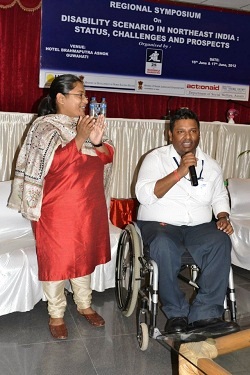It is shocking to hear the death of Nityananda Goswami, Superintendent of Police, Hamren District and his PSO Ratul Nunisa in an encounter with militants that went horribly wrong. I knew the late officer well and had seen his works from close proximity when I was heading the Assam Police Organization. He was quite active with a positive attitude and was always ready to shoulder any responsibility. He was socially active and maintained good community contacts. I do not know Ratul Nunisa who might have joined the force after I left the organization on retirement. But my respect goes to him for the manner in which he stood by his superior in the face of imminent death. His sacrifice is no less important than that of Goswami. Both equally deserve awards for bravery.
Based on the information that has come from the media, what I feel is that the SP, Hamren’s team landed into a trap laid out by the militants and it is possible that the militants themselves might have planted information to lure the officer into the trap. Whatever it is, the conduct of the additional SP and the other members of the team is not only condemnable but also amounts to serious misconduct, if the media reports are correct. When their SP was trapped, the next man in command should have taken over the charge of the operation and should have engaged the militants with the aim of rescuing their SP. This is no place to say what tactical maneuver for the purpose was necessary.
It also looks like that instead of a planned operation this was organized in a hurry without adequate preparation. When the team split into three groups, the inter-communication amongst them snapped and therefore instead of a cohesive movement, they groped around like blind groups purposelessly and in fear. Except the late S.P. and his PSO, all others simply seemed to be looking for an opportunity to abandon the operation and escape from the scene of engagement. Was the fear factor so strong that when the SP and his PSO went missing there was not even a thought of launching a counter-offensive to rescue the SP? Were the superior officers and the police HQs informed immediately? If there was army deployment in the area, the operation should have been coordinated with the army or at least their help should have been taken when the SP and his PSO went missing. The failure of this operation will embolden the militants and will adversely affect the morale of the local police force.
The State Government should conduct a high-level enquiry into this incident and should not treat it as a passing matter. If any lack has afflicted the force that led to its recent failures, it will come out only through a high level enquiry. The compensation package for the killed policemen should be quickly disbursed by the State Government. If there is any bottleneck in this matter, such bottleneck should be removed by the Home Minister, in this case the Chief Minister, through his personal intervention. Public feelings may not be ignored.
On January 28, 2014 an Additional SP Gulzar Hussain was also killed in an ambush by the NDFB in Assam's Sonitpur district. There is a standard practice for granting compensation to the family of security personnel who make supreme sacrifice for a cause for which the primary responsibility lies with the State. Providing security to its citizen is the constitutional responsibility of the State and the persons in uniform shoulder that responsibility on behalf of the Government of the State. The compensation given to a slain security person’s family is, therefore, not a generosity on the part of the Government but its duty. It is not given as a sympathy-package for the grief of the family but in order to ensure that the family overcomes the crisis falling on it on the death of the bread-earner. Disbursement of such compensation should be prompt and timely and the procedure for the purpose should be simplified. The Government should fulfill this obligation within days. The failure to do so is a serious negligence and should be viewed as misconduct committed by the designated officer concerned. If the designated officer is not from the decision-making level, procedural delay at lower level is bound to take place.
When a family has to wait uncertainly to get the compensation due to it, it adds to the grief and only an insensitive Government can ignore such a situation. Assam’s media has raised questions on this issue with examples and the Government should answer to the issues raised by the media to the satisfaction of the people. Otherwise, fingers will remain raised against the Government, and the person heading the Government himself becomes answerable. The Government should also keep in mind that such negligence affects the morale of the force operating in life-threatening situations.







































